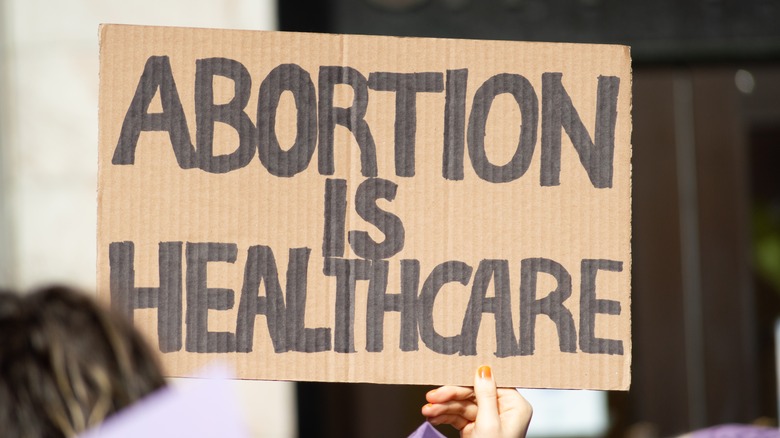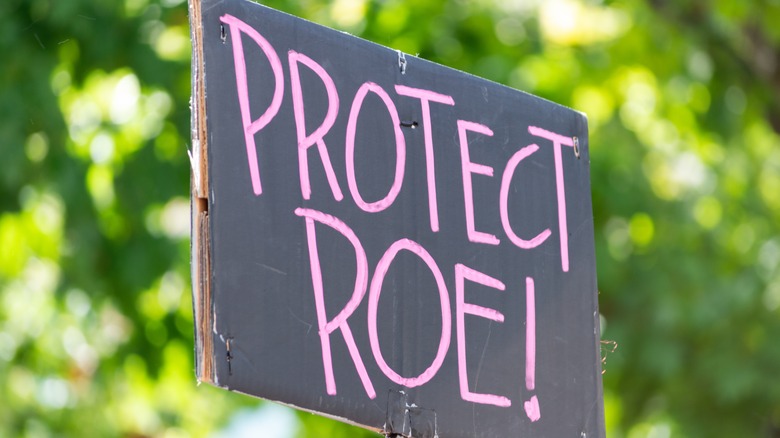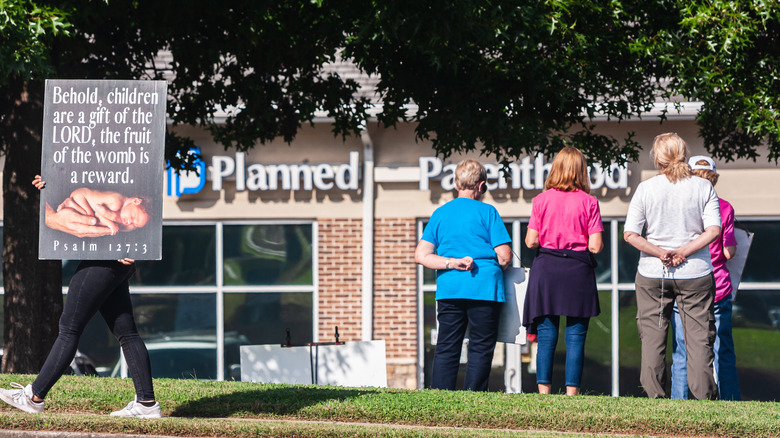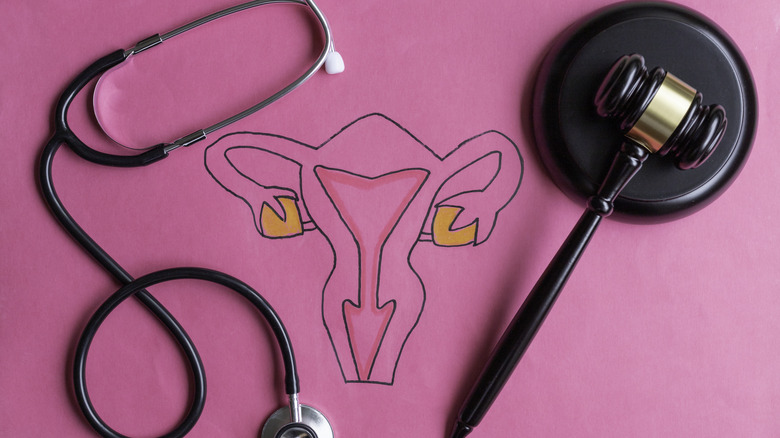One Year Post-Roe: What Does Abortion Access Look Like Today?
June 24th marks a year since the overturning of Roe v. Wade, when the Supreme Court ultimately decided to ban the constitutional right to abortion in the United States. The landmark case was first affirmed in 1973 when a woman under the pseudonym of Jane Roe advocated against a Texas law that made abortion illegal unless ordered by a doctor to save a woman's life. In January of 1973, it was issued that the Due Process Clause of the fourteenth amendment protected the 'right to privacy,' giving way for pregnant women to seek abortions freely.
Even today, abortion is a heavily controversial topic. The year anniversary of Roe v. Wade's overturning proves our politics surrounding women's autonomy continues to regress — now more than ever. From figuring out where abortion bans stand across the US to living in a post-Roe v. Wade world, many have had quite the year navigating their physical and emotional health.
While strict abortion laws continue to run rampant across the United States, there are states where measures have been put in place to protect abortion access. For out-of-state residents who are seeking an abortion, these measures ensure their safety and security. To mark a year since its overturning, we've rounded up accurate and updated information on what abortion access looks like today.
Shield laws and reproductive freedom
A number of states have enforced shield laws, which essentially provide legal protection to abortion providers if they offer services to out-of-state residents. These laws also protect those seeking abortions through identity protection and facilitating travel and care expenses, specifically because they come from states with restrictive healthcare policies. In some states, the shield law's protections extend to individuals helping to facilitate an abortion, either by financial support or helping to coordinate travel.
There are 14 states that have already enacted these protected policies with slight variances. Shield laws apply throughout pregnancy in states like Colorado, the District of Columbia, and New Jersey. In other states, like California, New York, Minnesota, and Washington, shield laws protect abortion access prior to viability.
More progressive states are lining up legislative policies that protect reproductive freedom, which can counteract some of Roe v. Wade's restrictions when it comes to telehealth. Over half of U.S. abortions are being facilitated through medication, which provides a safe, easy, and effective method of termination. Processes referred to as telemedicine abortions are included in some states' shield law policies, such as Massachusetts, Colorado, Vermont, and Washington. New York is working to enact a revolutionary policy that allows providers to send abortion pills to those living in restrictive states. Dr. Linda Prine, a New York physician and co-founder of the Miscarriage and Abortion Hotline, tells The New York Times, "I'm going to mail pills as soon as the governor signs the bill."
Abortion safe havens, sanctuary states, and their resources
States, where abortion access is still protected and allowed, are referred to as "sanctuary states," where out-of-state patients are flocking in large numbers. According to the program manager at an Illinois Planned Parenthood, Mara Pliskin, "We're being as creative as possible to really just work with every individual patient to resolve all those barriers that might stand in the way between making their decision and getting to our door," she explained to NPR. Illinois is one of the few progressive midwestern states, with a 25% increase in out-of-state abortions since last June.
Other sanctuary states, like California, New Mexico, and Maryland, are sandwiched between more restrictive, conservative states, much like Illinois, but are often far removed from one another. As abortion safe havens, some of these states even help pay for out-of-state travel expenses and abortion costs.
Even for political swing states like Michigan, protecting abortion rights and access to healthcare resources has become incredibly important. Governor Gretchen Whitmer promised, "We will make Michigan a leader, a place where everyone is respected and protected under the law, a place where women make their own decisions," she said in a Democratic election night speech covered by NPR. Thankfully, Michigan Democrats have already repealed its 1931 abortion ban and signed a bill that promotes reproductive services as a civil rights law.
Bubble zones protect patients
To protect abortion providers and patients, bubble zones have been legally designated in some states preventing protesters from interfering with treatment. These create a buffer around the vicinity of abortion clinics making them safe spaces. These bubble zones can also establish a barrier around the patients en route to the premises. By having these restrictions in place, patients can enter and exit clinics with their peace and privacy protected. These laws can also be applied to abortion providers whose safety may be compromised. With services like the confidential address program, clinic staff members are also guaranteed protection.
In addition to general bubble zone policies, some states have very specific guidelines. These include restrictions to blocking the entrance and exit ways at clinics, performing vandalism, harassing or threatening clinic staff members, or any other activities which can distract from clinical reproductive services. With these policies enacted, there's less likelihood for protestors to intimidate providers and impede the care of patients.
State laws vs constitutional amendments
ACLU's senior policy counsel Jessica Arons explained to Axios, "You can pass a bill that codifies abortion rights...but if a future election changes the political makeup of the legislature and who's in the governor's office, then they could repeal the statute." With more states implementing unshakeable constitutional amendments as opposed to state laws, courts will be bound to follow these pro-abortion policies. These amendments offer more ironclad protection of abortion rights, trumping the court's ability to invalidate state laws. Constitutional amendments are also being used to enforce the right to privacy —both for patients and providers.
There are currently 17 states that have laws that do secure the right to abortion. However, there are three states with constitutions that explicitly secure rights to abortion — California, Michigan, and Vermont. More states are expected to follow suit with constitutional protections that are difficult to remove or change, such as New York's highly-anticipated 2024 vote. Rather than operating only on the legality of local and state laws, constitutional amendments and protections offer a more guaranteed approach to abortion services.
East coast and midwest abortion havens
It's not just the progressive coastal states taking the charge, there are midwestern states advocating for reproductive rights. Michigan has some of the strongest abortion rights protections in the nation. And Minnesota was the first state to pass any pro-abortion policies following the overturn of Roe v. Wade when Democratic governor Tim Walz signed a bill that guarantees abortion access in the state. Minnesota has become a safe haven for patients seeking reproductive services in the region while protecting out-of-state travelers who may come from restrictive states that take legal action.
On the east coast, these abortion havens include states like New Jersey, Maryland, and Delaware, which have expanded reproductive healthcare protection and created policies that individually protect uterine autonomy. New York's legislation has passed both branches of its state legislature, leaving voters to ultimately decide whether abortion access should be included in the state's constitution.
As of right now, midwestern and eastern America are some of the best places to go if you're seeking a safe and secure abortion. You can start by finding verified abortion support and care near you, which comprehensively identifies your best contraception options, telehealth services, abortion procedures, and self-managed abortion resources.





